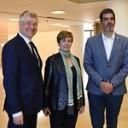 President Markkula leads a 'Science meets Regions' seminar during a visit in Euskadi hosted by CoR member and President of the Basque Government Lehendakari Iñigo Urkullu (ES/ALDE)
President Markkula leads a 'Science meets Regions' seminar during a visit in Euskadi hosted by CoR member and President of the Basque Government Lehendakari Iñigo Urkullu (ES/ALDE)
The world is changing fast. Europe's regions and cities have a chance to innovate and become pioneering, smart leaders, which can address the challenges through evidence based policy-making. As a Pioneering Smart Region, the Basque Country was the ideal setting to analyse the first year of the "Science meets Regions" pilot scheme, which took place under the coordination of the European Commission's Joint Research Centre (JRC) and the European Committee of the Regions (CoR).
"The Basque Country, like all of Europe's regions and cities, are confronted with a plethora of societal challenges. By enabling the scientific community, business and citizens to become catalysts of change, we want to mobilise local potential and find solutions together " said Markku Markkula, President of the CoR. " Basque projects are good examples of a bottom-up approach in Smart Region initiatives. During my visits to the EU-funded Mutriku Wave Energy Plant and the Basque Culinary Centre this week, I saw how local challenges can become strengths by building on synergies between education, research, innovation and government. It is crucial that no stakeholder remains outside of the ecosystem creation process, if you want to be on the pioneers map."
President Markkula met Inigo Urkullu, President of the Basque Country, in Vitoria-Gasteiz one year after attending in Bilbao the signature of the Basque Declaration on sustainability which seeks innovative ways of meeting current economic, environmental and social challenges. The Lehendakari Inigo Urkullu said: " The Basque Country seeks to position itself as an innovation and research benchmark in Europe. The 'Science meets Regions' seminar is an occasion to highlight that by sharing experiences and best practice, EU regions and cities can play a crucial role in the construction of Europe ".
Markku Markkula made a keynote speech at the 'Science Meets Regions' seminar in Donostia-San Sebastián on 3 May together with Arantxa Tapia, Basque Regional Minister for Economic Development and Infrastructures. Arantxa Tapia said: " As Europe is going through a period of renovation and with tensions being spread in several member states, the role of European Regions in the European project is more relevant than ever ". Regional Minister Tapia added: " At the European level, interregional cooperation and alliances amongst innovative and pioneering regions helps the Basque Country to raise its competitiveness ". This seminar was co-organised with the CoR and the JRC as well as the Basque government.
The "Science Meets Regions" pilot scheme has proven to be a success for local collaboration in 2016 with regional pilots taking place in Bratislava, Espoo, Karlsruhe, Sofia, Trieste, and Wiesbaden and covering diverse themes such as energy efficiency, smart cities, stability of capital markets, food security, active aging, smart specialisation, quality of education and climate change. A call for regional and local "Science meets Regions" events during 2017/2018 will be launched in June and their conclusions will feed into the annual "Science meets Regions" conference, scheduled for late 2017.
Contact:
David Crous
david.crous@cor.europa.eu